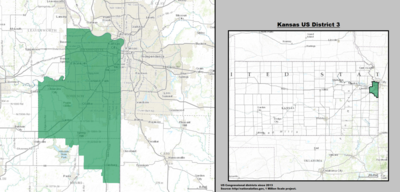Alec Johnson is a junior honors student majoring in political science and psychology at the University of Arkansas. He grew up in the tiny town of Mammoth Spring, Arkansas, and is an active member of Psi Chi and is an Honors College Fellow. After receiving his B.A. at the U of A, he hopes to attend law school and eventually become a federal judge.
 The 2018 Congressional election for Kansas’ 3rd district pits Republican incumbent Kevin Yoder against Democratic challenger Sharice Davids. Yoder served as a Kansas State Representative from 2003 to 2011 and is seeking his fifth term in the U.S. House of Representatives. Davids has no real political experience beyond her participation in the White House Fellowship program from 2016 to 2017. As highlighted by her website, she is a member of the Ho-Chunk Nation, a Native American tribe in Wisconsin; is highly trained in martial arts and has earned a law degree from Cornell.
The 2018 Congressional election for Kansas’ 3rd district pits Republican incumbent Kevin Yoder against Democratic challenger Sharice Davids. Yoder served as a Kansas State Representative from 2003 to 2011 and is seeking his fifth term in the U.S. House of Representatives. Davids has no real political experience beyond her participation in the White House Fellowship program from 2016 to 2017. As highlighted by her website, she is a member of the Ho-Chunk Nation, a Native American tribe in Wisconsin; is highly trained in martial arts and has earned a law degree from Cornell.
Davids won a crowded Democratic primary in August that featured six candidates fighting for the party’s nomination, including Bernie Sanders-backed Brent Welder. She received 37.3% of the 61,321, just edging out second-place finisher Welder, who received 33.9% of the vote. Her positions on issues like the economy, the environment and immigration include implementing a tax cut for the middle class, investing in renewable energy sources like wind and working with Republicans to develop a reformed immigration policy. The most important issue emphasized by Ms. Davids on the campaign trail, however, has been healthcare. She supports the expansion of Medicaid and in a recent interview with a local Kansas news station explained that she planned to help ensure that more Kansans would be able to obtain health insurance coverage. She has received endorsements from both Joe Biden and Barack Obama.
Yoder was able to easily win his primary in August, winning 68.1% of the vote according to Ballotpedia. He has received an endorsement from President Trump; however, much of his campaign work has involved distancing himself from the President’s far-right rhetoric. He did not attend a rally held by the president in Topeka, Kansas on October 6th. He has portrayed himself as a moderate, citing examples in which he worked with the previous Obama administration in a recent interview, and has attempted to characterize his opponent as a far-left radical that will cozy up to Nancy Pelosi in Congress. In that same interview, Yoder emphasized that he did not support Trump’s tariff policy, did not support the separation of children from their families at the U.S.-Mexico border, and did not support his style of tweeting. An issue Rep. Yoder has focused on is immigration. He has reiterated on a number of occasions that his opponent supported abolishing ICE in a July podcast interview, a sentiment Davids has now retracted.
The across-the-aisle appeals of both Davids and Yoder are the result of the current demographics of Kansas’ 3rd district and its recent voting history. Located in eastern Kansas and containing Kansas City and its surrounding suburbs, the 3rd district narrowly voted in favor of Hilary Clinton in the last election after voting in favor of Mitt Romney in 2012. The district is considered more urban than any other Kansas congressional district and is home to an increasing number of wealthy, college-educated people. As a result, it was included in the Democratic Congressional Campaign Committee’s list of targets for 2018. Ms. Davids has outraised Rep. Yoder by more than $1.6 million since July and is leading her opponent by nine points according to the most recent poll conducted by the New York Times. These poll results follow a number of previous polls that show her ahead of her Republican opponent. Couple this lead in the polls with increased fundraising and a growing population of college-educated individuals in Kansas’ 3rd district, and it appears the Democratic challenger will overcome her opponent’s incumbency advantage to win the election on November 6.
